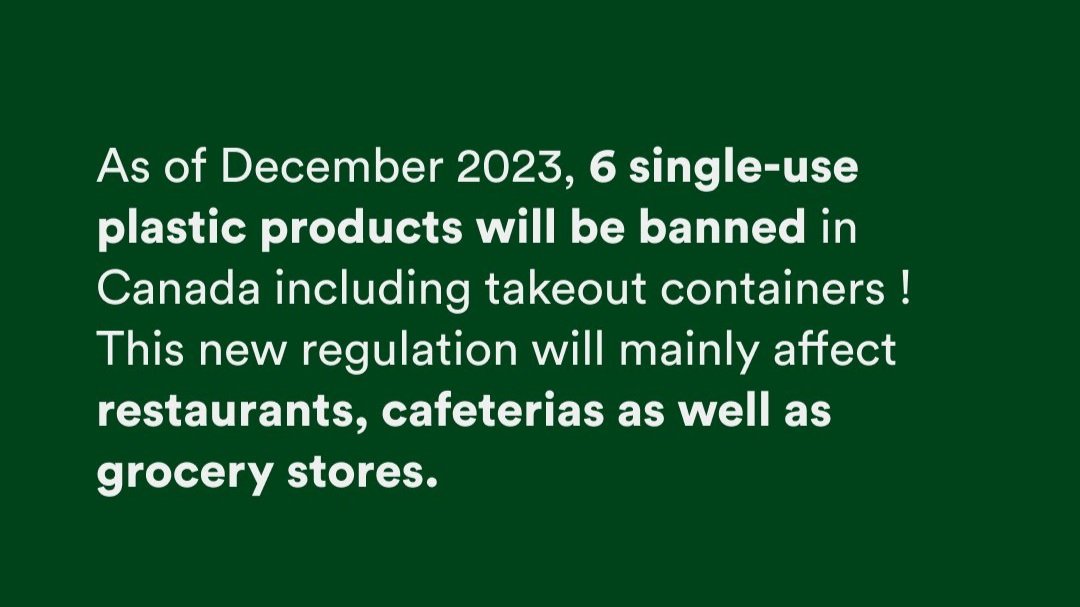In 2023, single-use plastics will finally be banned in Canada!
June 20th, 2022 was a historic day for our environment in Canada. The Government of Canada has announced a comprehensive plan to ban single-use plastics! This new regulation will mainly affect restaurants for take-out drinks and meals as well as grocery stores, which will have to find new ecological and zero-waste solutions for packaging.
The rules in a nutshell
The Minister of Environment and Climate Change, Mr. Steven Guilbeault, and the Minister of Health, Mr. Jean-Yves Duclos, announced a final regulation aimed at prohibiting the manufacture, import, and sale of 6 categories of single-use plastics:
· Take-out food containers that are difficult to recycle;
· Utensils;
· Shopping bags;
· Ring holders for beverage packaging;
· Stirring sticks;
· Straws (with some exceptions).
This regulation will enter into force in December 2022. As these changes are major for businesses and in order to give them enough time to make this transition and exhaust their current stocks, the sale of these items will be prohibited from December 2023. This action places Canada among the world leaders in the fight against plastic pollution. It contributes to meeting the commitments of the Ocean Plastics Charter and the United Nations Sustainable Development Goals (SDGs).
The situation in Canada: Every year!
More than 4 million tons of plastic are generated
Only 8% is recycled.
More than 1.3 million tonnes of hard-to-recycle plastic products are sent to landfills.
About 15 billion plastic shopping bags are used each year and about 16 million straws are used.
Montreal is leading the way: Prohibition in March 2023
Last August, the Mayor of Montreal, Valérie Plante, announced a similar regulation that aims to ban certain single-use plastic items in restaurants and food establishments. The regulation will enter into force on March 1, 2023. After this date, it will be prohibited to distribute, for on-site or nomadic consumption (take-out or delivery), a single-use item made from plastic bearing the codes of the following identifications:
Platter (excluding meat and fish): # 6
Plate: #6
Container and lid: # 6
Cup or glass lid: #6
Cup or glass: #1, 2, 3, 4, 5, 6 and 7
Stick: # 1, 2, 3, 4, 5, 6 and 7
Straw: # 1, 2, 3, 4, 5, 6 and 7
Utensil for consumption on the spot: # 1, 2, 3, 4, 5, 6 and 7
Utensil on request to take away: # 6
Most importantly, it will also be prohibited to distribute any single-use item made from degradable plastic that consumes much more water and land and emits a lot of CO2 emissions for their production. Biodegradable and compostable packaging cannot be handled by residential compost centers in major cities. “Compostable tableware will largely end up in the ‘foreign body’ category and will have to be eliminated” (Radio-Canada, 2021). Here are the types of prohibited plastics:
Oxodegradable
Biodegradable
Compostable!
Several Canadian cities such as Vancouver and Toronto also have plans to eliminate and reduce the use of single-use plastics, making the adoption of these government measures even more important and necessary to encourage a quick and effective transition.
Start the transition sooner rather than later
These new regulations are major for the reduction of single-use plastics, but what will be even more important is not only to reduce pollution by plastic objects but also to reduce production at the source and focus on the reuse of products. The federal government provides government assistance for companies affected by these new regulations as well as support for citizens in their choice of alternatives to single-use plastics.
In the meantime, here are our own recommendations:
Offer reusables for take-away;
Cano self-service containers are easy to borrow and return without deposit (everyone wins!)
Accept personal containers;
Implement a safe process to serve customers in their reusable containers when possible (MAPAQ approved)
Offer and encourage on-site consumption with traditional tableware;
If you have any questions or need support in your transition, do not hesitate to contact us! info@concompany.com
Sources :
https://www.canada.ca/en/environment-climate-change/news/2022/06/canadas-comprehensive-approach-to-zero-plastic-waste.html
https://montreal.ca/articles/plastiques-usage-unique-ce-que-vous-devez-savoir-sur-la-reglementation-20549


